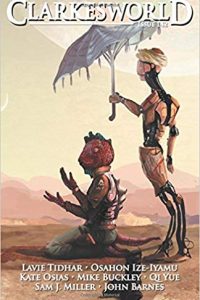Gary K. Wolfe reviews Jo Walton
 For any reader, there are always two histories of science fiction and fantasy (or of any other literature, for that matter). There is the formal evolutionary history that we critics and academics like to putter with, and there is our own personal history of what we read and when we read it, and which is frankly much more difficult to capture in a narrative that isn’t purely self-indulgent (as too many memoirs by writers tend to be). But it’s the latter that has the best chance of expressing the sheer hypnotic appeal, even the survival value, of the fantastic, of how it fits into our lives and forms our attitudes. Writers from the mainstream (Junot Díaz) to core SF (Robert Charles Wilson) have touched upon this effectively in novels and stories, but I don’t believe I’ve seen, either in fiction or in memoir, as brilliant and tone-perfect an account of what discovering SF and fantasy can mean to its young readers – citing chapter and verse of actual titles – as in Jo Walton’s remarkable and somewhat autobiographical new novel Among Others. Late in the novel, when the spirited 15-year-old narrator Morwenna Phelps is assigned Thomas Hardy’s Far from the Madding Crowd in her English class at the English boarding school to which she’s been more or less exiled, she concludes her somewhat snarky response to it by commenting, ‘‘He could have learned a lot from Silverberg and Delany.’’ By this point we’ve already gotten accustomed to Mori’s precociously sharp running commentaries on the SF novels she reads voraciously and uses to construct a safe haven, a kind of culture in exile both from her problematical family and from the staid adult world – including Hardy – for which she feels the disdainful impatience of the bright adolescent. What is remarkable is not only how Walton evokes the capacity of fiction to preserve wonder and hope in a dispiriting world, but how she conveys this, as with the Hardy comment, in the opinionated but not quite fully-formed voice of a teenager discovering these works at the tail-end of the 1970s, which comes across as a kind of Golden Age of SF in Mori’s narrative, with Tolkien already established as canonical, Heinlein just entering his cranky late phase, and Le Guin, Zelazny, and Tiptree, along with the historical novels of Mary Renault, coming as astonishing revelations to a young British reader.
For any reader, there are always two histories of science fiction and fantasy (or of any other literature, for that matter). There is the formal evolutionary history that we critics and academics like to putter with, and there is our own personal history of what we read and when we read it, and which is frankly much more difficult to capture in a narrative that isn’t purely self-indulgent (as too many memoirs by writers tend to be). But it’s the latter that has the best chance of expressing the sheer hypnotic appeal, even the survival value, of the fantastic, of how it fits into our lives and forms our attitudes. Writers from the mainstream (Junot Díaz) to core SF (Robert Charles Wilson) have touched upon this effectively in novels and stories, but I don’t believe I’ve seen, either in fiction or in memoir, as brilliant and tone-perfect an account of what discovering SF and fantasy can mean to its young readers – citing chapter and verse of actual titles – as in Jo Walton’s remarkable and somewhat autobiographical new novel Among Others. Late in the novel, when the spirited 15-year-old narrator Morwenna Phelps is assigned Thomas Hardy’s Far from the Madding Crowd in her English class at the English boarding school to which she’s been more or less exiled, she concludes her somewhat snarky response to it by commenting, ‘‘He could have learned a lot from Silverberg and Delany.’’ By this point we’ve already gotten accustomed to Mori’s precociously sharp running commentaries on the SF novels she reads voraciously and uses to construct a safe haven, a kind of culture in exile both from her problematical family and from the staid adult world – including Hardy – for which she feels the disdainful impatience of the bright adolescent. What is remarkable is not only how Walton evokes the capacity of fiction to preserve wonder and hope in a dispiriting world, but how she conveys this, as with the Hardy comment, in the opinionated but not quite fully-formed voice of a teenager discovering these works at the tail-end of the 1970s, which comes across as a kind of Golden Age of SF in Mori’s narrative, with Tolkien already established as canonical, Heinlein just entering his cranky late phase, and Le Guin, Zelazny, and Tiptree, along with the historical novels of Mary Renault, coming as astonishing revelations to a young British reader.
Mori has plenty of need for a safe haven. Sent to live with her hapless father after an accident which disabled her and killed her beloved twin sister, and plagued by a demented mother whose experiments with magical powers may have caused the accident, she’s quickly packed off to an exclusive girls’ boarding school in England, far from her familiar Welsh village. Fortunately, she’s armed not only with her reading – which is encouraged by her father, something of a geek himself – but by a few magical tricks of her own, including the ability to see fairies (who, in a nice touch, favor hanging around industrial ruins). Seeking to find a karass for herself (borrowing of course from Vonnegut), she casts a spell which, with the aid of a couple of sympathetic librarians, brings her into contact with an SF discussion group at the local public library. The members of the group – mostly men in their thirties, with a couple of local teenagers and a gray-haired woman who favors Le Guin (the characters cleverly match their taste in fiction, with one of the men comparing everything to Philip K. Dick) – may seem vaguely familiar to anyone who’s hung around SF fans, but they are far from the nerd stereotypes one might expect, and among them is a gorgeous blond-haired local bad boy named Wim, about whom Mori is repeatedly warned but who quickly becomes the focus of her attention.
Cast in the form of Mori’s diary entries covering some six months at the end of 1979 and the beginning of 1980, Among Others initially is carried along largely on the insouciant, irrepressible voice of Mori herself, reading almost like a Dickensian coming-of-age tale, complete with such colorful secondary characters as Mori’s meddling aunts who control her father’s purse-strings and decide on the school she’ll attend; the father himself, who has also used his love of SF to construct his own perimeter against his powerlessness; a variety of classmates with their own problems (Mori helps one of them out by ghosting a poem for a competition, then is stunned when her own poem loses to it); her grandparents (especially Sam, her father’s dad, who helps open up a still wider world of reading); those sympathetic librarians; and of course the members of the reading group. The novel is rich in fully realized characters, but the major arc of suspense that develops involves what really happened on the night that Mori was injured and her sister killed, and what dark and irrational schemes her mother might still have in mind for her. Walton carefully modulates her introduction of the more supernatural aspects of the tale, keeping most of them (and the mother as well) understated and ambiguous until Mori is forced to make a crucial decision late in the narrative. Among Others is many things – a fully realized boarding-school tale, a literary memoir, a touching yet unsentimental portrait of a troubled family – but there’s something particularly appealing about a fantasy which not only celebrates the joy of reading, but in which the heroine must face the forces of doom not in order to return yet another ring to some mountain, but to plan a trip to the 1980 Glasgow Eastercon. That’s the sort of book you can love.






Pingback:Tweets that mention Locus Online Reviews » Gary K. Wolfe reviews Jo Walton -- Topsy.com
Pingback:Amongst Others | Wis[s]e Words
Pingback:Stainless Steel Droppings » Blog Archive » Among Others ~Jo Walton
I was listening to your podcast with Jonathan Strahan the other day and this book just leapt out of the speakers at me. I rushed out the next day and purchased it and loved it. It is so special and unusual and fantastic. Now I have to go back and listen again to see what else you both recommended, because you hit one out of the ballpark with this one.